
Lieutenant General Arthur MacArthur, Jr., was a United States Army general. He became the military Governor-General of the American-occupied Philippines in 1900 but his term ended a year later due to clashes with the civilian governor, future-U.S. President William Howard Taft.

The General of the Armies of the United States, or more commonly referred to as General of the Armies, is the highest possible rank in the United States Army. The rank is informally equated to that of a six-star general or Generalissimo and is one of the two highest possible operational ranks in the United States Armed Forces.
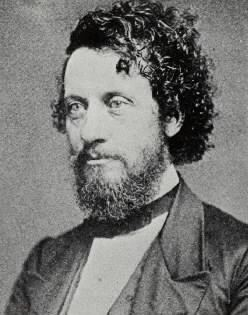
Arthur MacArthur, Sr., was a Scottish American lawyer and judge. He was the fourth Governor of Wisconsin and was an Associate Justice of the Supreme Court of the District of Columbia. He was the father of General Arthur MacArthur, Jr., and the grandfather of General Douglas MacArthur.
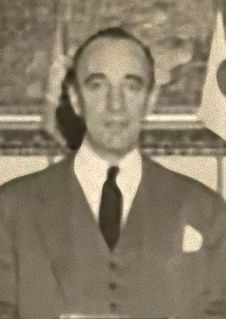
Douglas MacArthur II was an American diplomat. During his diplomatic career, he served as United States ambassador to Japan, Belgium, Austria, and Iran, as well as Assistant Secretary of State for Legislative Affairs.
A farewell speech or farewell address is a speech given by an individual leaving a position or place. They are often used by public figures such as politicians as a to the preceding career, or as statements delivered by persons relating to reasons for their leaving. The term is often used as a euphemism for "retirement speech", though it is broader in that it may include geographical or even biological conclusion. In the Classics, a term for a dignified and poetic farewell speech is apobaterion (ἀποβατήριον), standing opposed to the epibaterion, the corresponding speech made upon arrival.
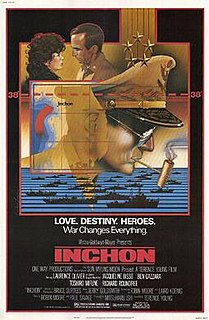
Inchon is a 1981 epic war film about the Battle of Inchon, considered to be the turning point of the Korean War. The film was directed by Terence Young and financed by Unification movement founder Sun Myung Moon. It stars Laurence Olivier as General Douglas MacArthur, who led the United States surprise amphibious landing at Incheon, South Korea in 1950. Also featured are Jacqueline Bisset, Ben Gazzara, Toshiro Mifune, and Richard Roundtree. It was filmed in South Korea, California, Italy, Ireland and Japan.
Elizabeth Cooper was a Filipina film actress, vaudeville dancer, and singer. In addition to her brief movie career, Cooper was also known for being the mistress of General Douglas MacArthur.
The 24th Regiment Wisconsin Volunteer Infantry was an infantry regiment that served in the Union Army during the American Civil War.

Buna is a village in Oro Province, Papua New Guinea. It was the site in part, of the Battle of Buna-Gona during World War II, when it constituted a variety of native huts and a handful of houses with an airstrip. Buna was the trailhead to the Kokoda Track leading to Kokoda.
Riley Alvin Bender was a United States businessman and political candidate.
Events from the year 1764 in Ireland.
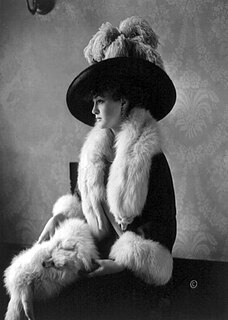
Louise Cromwell Brooks was an American socialite whose four marriages included seven years as the first wife of General Douglas MacArthur. She was "considered one of Washington's most beautiful and attractive young women".

A six-star rank was a short-lived 1955 proposal for a special grade immediately superior to a five-star rank, to be worn by a proposed General of the Armies of the United States. The rank was also briefly considered near the end of World War II, just prior to the planned invasion of Japan, which would have potentially seen a six-star Admiral of Navy, equal to the then also proposed rank of General of the Armies and superior to five-star rank of Fleet Admiral.
Geoffrey Perret is an English author who writes about American history. His work focuses primarily upon the political dynamics that influence strategic and tactical military decisions, as well as broader political themes. He has published over thirteen books dealing with a variety of topics, among them the U.S. Presidency - including several biographies of iconic Presidents such as John F. Kennedy and Ulysses S. Grant - leading American military commanders such as Douglas MacArthur, and pivotal American military engagements.
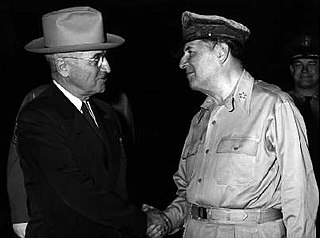
On 11 April 1951, U.S. President Harry S. Truman relieved General of the Army Douglas MacArthur of his commands after MacArthur made public statements which contradicted the administration's policies. MacArthur was a popular hero of World War II who was then the commander of United Nations forces fighting in the Korean War, and his relief remains a controversial topic in the field of civil–military relations.

General Douglas MacArthur is a public artwork by American artist Robert L. Dean, a 1953 graduate of the United States Military Academy. Previously, the statue was located in MacArthur Square in the Milwaukee Civic Center Plaza, downtown Milwaukee, Wisconsin, USA. On June 7, 2014, it was relocated to its new waterfront location at Veterans' Park, next to the Milwaukee County War Memorial Center. With full military honors, the bronze statue of General Douglas MacArthur was rededicated at its new home on June 7, 2014. The ceremony was the capstone event for the MacArthur Memorial Week, held nearly 35 years after the statue's original dedication on June 8, 1979.
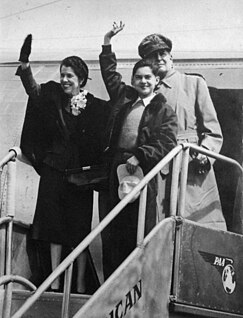
Arthur MacArthur IV is the only child of General of the Army Douglas MacArthur and Jean MacArthur. He is also the grandson of Lieutenant General Arthur MacArthur, Jr.
MacArthur or Macarthur is a surname, originating with the Scottish Clan MacArthur and now spread through English-speaking countries. Notable people with the surname include:












